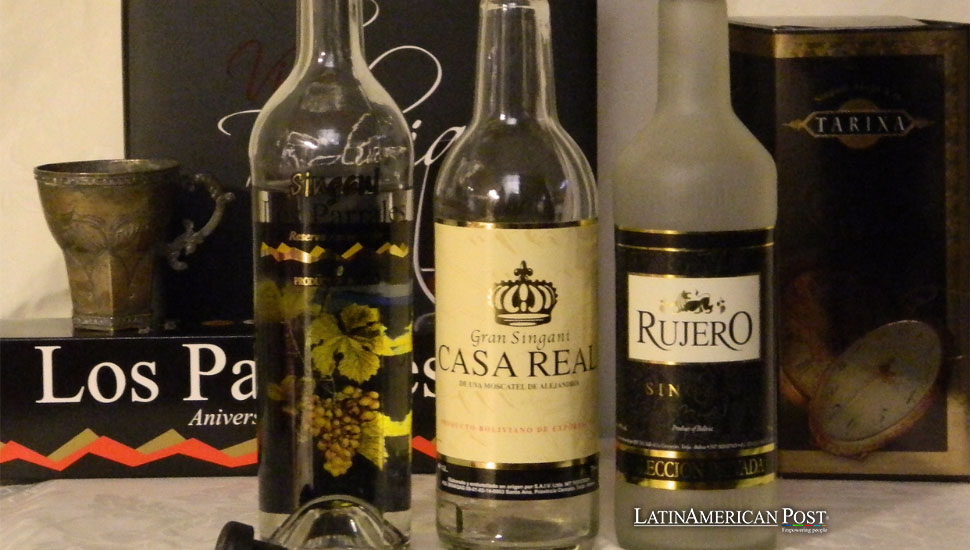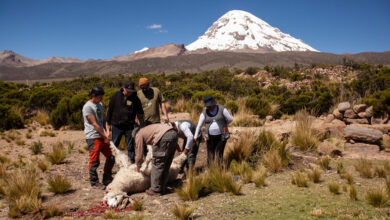Bolivian Brandy Singani Captivates Connoisseurs and Hollywood

Singani, a unique Bolivian brandy made from Muscat of Alexandria grapes grown high in the Andes, is gaining international recognition. This aromatic spirit is poised to make its mark beyond Bolivia’s borders thanks to Hollywood’s embrace, particularly by director Steven Soderbergh.
Singani is a spirit that embodies Bolivia’s high-altitude terroir. Made exclusively from Muscat of Alexandria grapes grown at elevations of at least 1600 meters above sea level, It reflects its unique environment. The brandy is rarely oak-aged, which allows the grape’s floral character to shine through in every sip. This distinctiveness sets Singani apart from other clear spirits like vodka or gin.
Bolivians have produced Singani for nearly 500 years, ever since Spanish conquistadores introduced grape cultivation and distillation techniques to the region. Despite its long history, Singani remained relatively unknown outside Bolivia until recently. As Wine-Searcher first reported, the spirit’s clarity, much like vodka or gin, made it an intriguing discovery for those beyond Bolivia’s borders. It’s no wonder that enophiles, drawn to the complexity and uniqueness of this high-altitude brandy, find themselves enamored with Singani.
The spirit’s deep roots in Bolivian culture are evident in its everyday uses. In the Bolivian Amazon, for example, locals use Singani to enhance their Yungueño—a rough pure alcohol softened by aging in underground glass jars. This practice, a testament to the spirit’s versatility, has been passed down through generations.
The Hollywood Connection
Singani’s journey from the Andes to Hollywood is nothing short of cinematic. The turning point came in 2007 when acclaimed director Steven Soderbergh traveled to La Paz, Bolivia, to film scenes for his epic movie “Che,” which chronicles the life of revolutionary Che Guevara. During a crew party in Madrid, the Bolivian casting director gifted Soderbergh a bottle of Singani, sparking an unexpected love affair with the spirit.
Soderbergh, a longtime vodka drinker, was immediately captivated by the unique qualities of Singani. “My dad had been a vodka drinker, but he tried this and that was it,” Soderbergh’s daughter, Sarah Soderbergh, told Wine-Searcher. What started as a personal preference soon evolved into a mission to introduce Singani to a broader audience. Soderbergh was so enamored with Singani, specifically the brand produced by Casa Real, Bolivia’s largest producer, that he had a pallet of the spirit shipped to the United States for personal consumption.
This wasn’t just a passing interest; Soderbergh was dedicated to sharing Singani with others, frequently retrieving bottles from his stash and offering them to friends and colleagues. His passion for the spirit led to misunderstandings with U.S. authorities, who suspected he was selling the imported bottles. But Soderbergh was drinking and sharing his new favorite spirit—a testament to his genuine love for Singani.
The Battle to Bring Singani to the World
Soderbergh’s enthusiasm for Singani didn’t stop at personal consumption. He took on the challenge of making Singani available to a broader audience by advocating for its commercial importation to the United States. This endeavor was far from simple. It required an eight-year battle with the U.S. Alcohol and Tobacco Tax and Trade Bureau (TTB) to have Singani recognized as a unique type of brandy, distinct from other spirits. This recognition, as first reported by Wine-Searcher, was finally achieved last year.
The process wasn’t without its complexities. Bolivia had to recognize Bourbon and Tennessee whiskey as unique American products in exchange for the U.S. acknowledging Singani as a distinct category. This diplomatic exchange underscored the significance of Singani’s official recognition, paving the way for its introduction to the global market.
With the TTB’s approval secured, Soderbergh is collaborating with Casa Real to import a premium version of the spirit, aptly named Singani 63. The number “63” holds personal significance for Soderbergh, representing his birth year and favorite number. As Sarah Soderbergh, who has joined the sales and marketing efforts for Singani 63, explained, “It’s not hard to be more interesting than vodka… But Singani is considerably more interesting than most clear spirits.”
Singani’s distinctiveness lies in its origins. It’s an official Denomination of Origin (DO) product that can only be produced from grapes grown in a specific area of Bolivia. In this mere 30-square-mile region, the altitude and climate create the perfect conditions for cultivating Muscat of Alexandria. The country’s vines are old; many predate the phylloxera epidemic that devastated European vineyards, adding to the spirit’s unique character.
Casa Real’s CEO, Louis Pablo Granier, who studied industrial engineering at the University of Arkansas and winemaking in Mendoza, Argentina, highlighted the challenges and rewards of producing Singani. “The soil is impoverished… There’s not much water. We get rain only once a year,” Granier told Wine-Searcher. The extreme UV rays at high altitudes also affect the grapes, leading to thicker skins and a higher aromatic profile. “You can love or hate it, but Singani is so aromatic. All those aromas come from the grapes.”
A Spirit Destined for Global Acclaim
With Singani 63 now available in the U.S., the spirit is poised for greater recognition on the global stage. Soderbergh’s involvement has brought Singani into the spotlight, attracting the attention of both spirit enthusiasts and the wider public. The brand’s unique characteristics—its high-altitude origins, intense floral aromas, and rich history—set it apart from other spirits in the market.
Singani’s versatility also contributes to its appeal. It’s excellent in cocktails, whose floral notes complement a range of flavors, and stands out when enjoyed simply on the rocks. As Soderbergh discovered, Singani’s full aromatic potential is unleashed when served over a single large ice cube, offering a sensory experience unlike any other spirit.
The story of Singani is one of tradition meeting modernity. While it has been produced in Bolivia for centuries, its recent introduction to the U.S. market marks the beginning of a new chapter for this storied brandy. The involvement of a Hollywood heavyweight like Soderbergh has undoubtedly accelerated Singani’s journey to international acclaim, but the spirit’s intrinsic qualities are what will sustain its popularity.
Also read: Tsimane of Bolivia Share Secrets of Health in Amazon
As Granier continues to refine the production process, blending grapes harvested at different times to balance acidity and concentration, Singani’s profile will only continue to grow. The meticulous care taken in its production—from the vineyards in Bolivia’s highlands to the French Charentais pot stills used for distillation—ensures that every bottle of Singani 63 truly represents Bolivia’s rich viticultural heritage.
Singani’s rise from a little-known Bolivian brandy to an internationally recognized spirit is a testament to its unique qualities and the passion of those who produce and promote it. As more people worldwide discover Singani, it’s clear that this high-altitude spirit is destined for global acclaim, continuing to captivate connoisseurs and casual drinkers alike with its distinctive aroma and flavor.





